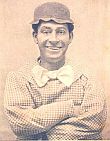Minstrel comic, endman, singer, writer, manager.
The son of a musician and older brother of minstrel singer Maud Fanning, Charles Fanning, along with W. Horace Bent and Will Whitburn, is considered one of the three leading Australian comedians and endmen to have worked the late nineteenth-century minstrel stage. He worked primarily as Mr Bones during the first part of each minstrel performance and specialised in comedy song and dance routines during the olio section (second part). Much of the material for these performances, including the songs, was written either by himself or in collaboration with other comedians. Fanning was also a regular and popular attraction in the farce that concluded each evening's entertainment, and is also known to have contributed to the creation of many of the productions in which he appeared during the late 1880s and 1890s.
Fanning was associated with Frank Smith (Alhambra Music Hall, Sydney) and F. M. Clark during the mid-1880s and became a high-profile artist under the management of F. E. Hiscocks, the Cogill Brothers, and Dan Tracey during the late 1880s and early 1890s. He formed business partnerships with Perry Ryan and Martyn Hagan ca. 1888, toured his own concert company during the early 1890s, and began a long-term association with Harry Rickards in 1893. The following year, he teamed up with the titian-haired American variety artist Georgie Devoe, whom he later married. Fanning and Devoe remained more or less permanently with Rickards until 1899, at which time he formed his own minstrel and burlesque company. Some two years later, the couple left Australia with their young daughter Charlotte to tour the UK and USA variety circuits (ca. 1901-1908). They returned to Australia in 1909, initially on a two-year Rickards contract, but later undertook engagements with James Brennan, Holland and St John (Brisbane), and Humbert Pugliese (Sydney), before moving to South Africa. Charles Fanning died of consumption in Cape Town in January 1916.

